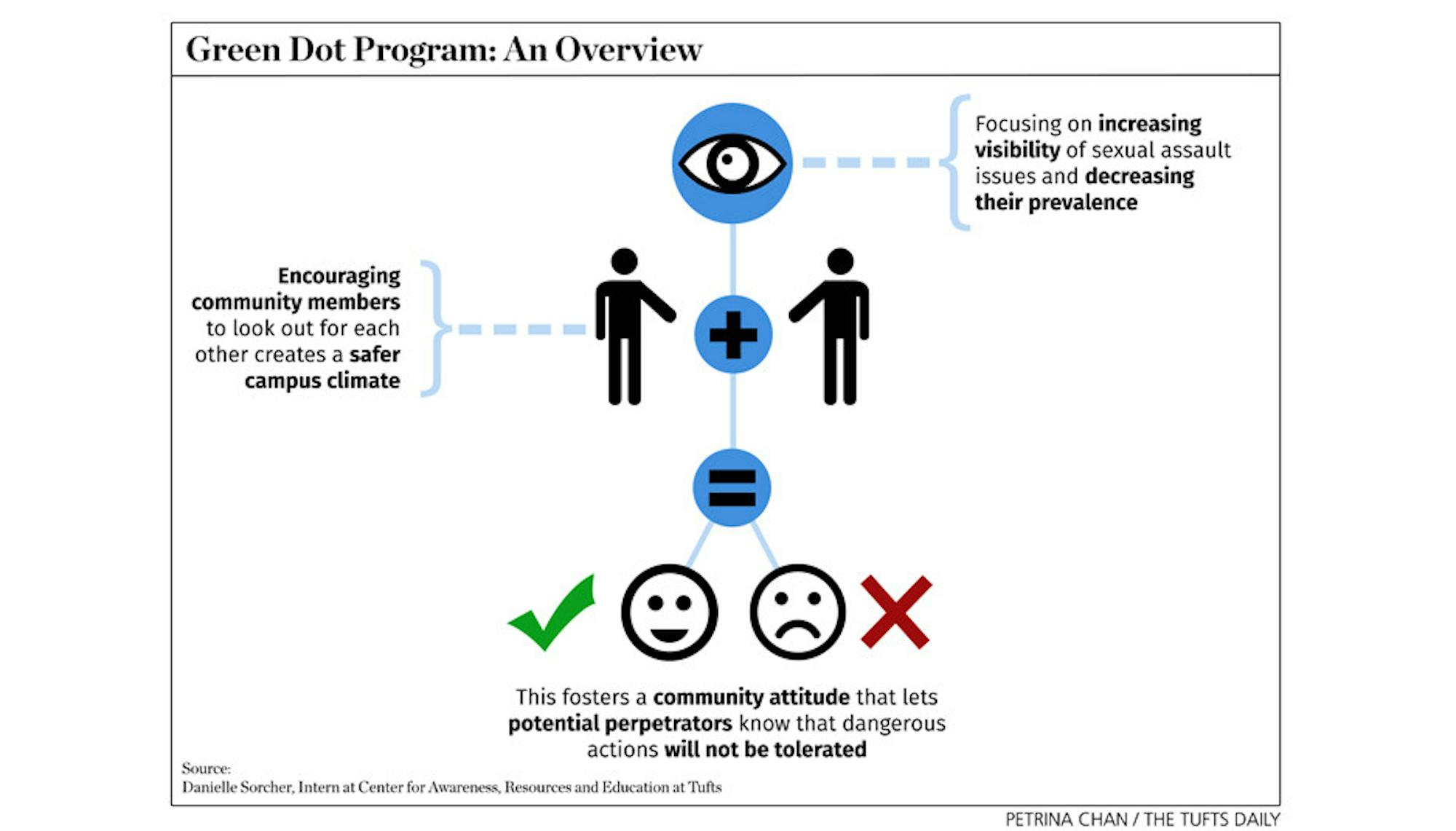The Center for Awareness, Resources and Education (CARE) at Tufts has been promoting the Green Dot initiative for violence prevention throughout the month of April, which is Sexual Assault Awareness and Prevention Month.
Students from CARE have promoted the Green Dot initiative — which visualizes instances related to sexual assault and highlights the actions of those working to eliminate such behavior — by tabling, hosting training sessions and creating informational material this past week.
“We’re holding Green Dot trainings for student groups and teams, we’re painting the Cannon green and we’re posting fliers that encourage Green Dot behaviors at Spring Fling,” Danielle Sorcher, a CARE intern, said.
According to the Green Dot website, the initiative was founded in 2010 by Dorothy Edwards, director of the University of Kentucky Violence Intervention and Prevention Center, at her university. This program has now become a transnational movement, with schools across the globe receiving violence prevention training.
Sorcher, a senior, explained that the movement promotes active behavior to reduce the prevalence of sexual assault incidents on campus. CARE released a video advocating for the Green Dot program yesterday afternoon with several other individuals and student groups, including members of B.E.A.T.s, Theta Chi fraternity, the Tufts Community Union Senate and Senior Class Council.
"If you think of a map of our campus, red dots are sexual violence and any actions that perpetuate a dangerous culture," Sorcher said in the CARE video. "Green dots are any actions that we can take to make a red dot less likely to appear on our campus map. We want the green dots to overwhelm the red dots in number."
Students from CARE also tabled in the Dewick-MacPhie Dining Center and in the Mayer Campus Center to discuss the program. A large green poster was displayed on the table with room for students to leave post-it note responses to the question, "What would Tufts look like without sexual violence?"
A few of the dozens of responses included, "I wouldn't worry about my friends when they leave a party," "It wouldn't look like Tufts at all" and "I wouldn't have nightmares."
Sorcher said that students who witness sexually violent behavior are encouraged to speak out against it, making them a “green dot” in the greater visualization of the dots in a community.
“If everybody does something — no matter what that something is—then we can create a safer campus climate," she said. "People are more likely to take action if they see others doing so, and if they see that as the expected and accepted response.”
Sorcher explained that Alexandra Donovan, a sexual misconduct prevention specialist, was the one who first approached her about the potential of the program at Tufts.
"After doing further research, I knew that this movement could really make a difference on our campus culture, and I wanted to get the Tufts community involved,” Sorcher wrote to the Daily in an email.
The climate surrounding sexual assault and sexual violence has often led to frustration between administrators and student-led organizations striving to create a safer atmosphere, Allyson Blackburn, executive board member of the Consent Culture Network, told the Daily in an email interview in February.
With the Green Dot movement, Sorcher hopes to “encourage community members to look out for one and other, and create a community attitude that lets potential perpetrators know that dangerous actions will not be tolerated.”
Since the program started, Donovan said that it has been well-received by the Tufts community.
“We’ve gotten an amazing response to this. It's really exciting, and we want to help push the program out there...as a more proactive and empowering solution, which is needed, so people know there is student to student action happening,” she said.
Cameron Simko, who worked with CARE on the educational video, said he first became involved in the Green Dot program because of his participation in the Student Athlete Advisory Committee.
“I heard about [the program] in a presentation from athletes at Connecticut College," Simko, a senior, told the Daily in an email. "At Conn., the Green Dot program heavily revolves around sporting events (think Fan the Fire level). I was first excited to see that athletics could have a social impact on a campus, but also appreciated the fact that the framework behind the Green Dot program made it less intimidating to address a very real topic at college campuses."
Simko, along with Sorcher, hopes the Green Dot program will de-stigmatize talking about sexual assault on campus, as well as help in spreading a healthy culture of active prevention. He said that many of these conversations with him are initiated through a green dot sticker he has on his water bottle.
“I frequently get asked about it and a normal conversation turns into an opportunity for me to spread awareness about preventing sexual assault,” Simko said.
Simko stressed the necessity to not only talk about sexual assault problems, but to live the mission of the Green Dot program.
“It's on all of us to look out for one another and speak up when something isn't right," he said. "Something as small as checking on your friends before they leave a party is a simple way to be a Green Dot.”
CARE promotes Green Dot program for sexual violence prevention






